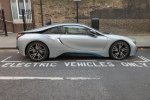Battery Cost Per Mile
by Ron Drake
(Prescott , AZ)
I would like to understand the relationship of the battery cost per mile of a daily commute by varying the distance, the system voltage and battery type. I would be interested as well in the battery cost per mile of DC vs. AC inverter technology.
Hi, Ron -
Because conversions (and EVs in general) are not all the same, and not equally efficient, it would be impossible to make an equation which applies to all electric cars. However, I can send you to a Wikipedia battery type comparison, which may allow you to construct your own equation.
The cost per mile is strongly linked to the cycle life of the battery. (Cycle life, as you probably already know, is the number of times you can discharge the battery and then charge it back up again before it won't take a charge anymore and you have to replace it.)
Different battery types and chemistries all have their characteristic cycle life. Even though some kinds of batteries may be initially more expensive, they may have such high cycle life that it levels the playing field.
The effect of system voltage: you want enough voltage - not too much, not too little - to power your car. Too little voltage and the amp draw increases; too much voltage, and the amp draw also increases. See this motors and drives article for more info on this. Increased rate of amp-draw from the batteries runs them down more quickly, thanks to the Peukert effect, giving you fewer miles per cycle.
Along those same lines, if you have a lead foot, you will get fewer miles per cycle. Your driving habits really affect your cost per mile, just like with the gas-gobbler; )
The effect of commute distance: Deep discharges (more than 80%) shorten the life of your deep cycle lead-acid batteries, which means you'll be replacing them more frequently.
Which leads me to...
The effect of battery abuse: Leading cause of premature battery death is murder. Battricide. You'll save yourself a fortune in replacement costs by 1) investing in a good quality charger, appropriate to the battery chemistry and type; and 2) learning all there is to know about the https://batteryuniversity.com/">care and feeding of your batteries.
On the second half of your question - all other things being equal, an AC system will give you more range (and so more miles per cycle, and so lower cost) than a DC system for two reasons: One, the AC motor can utilize a more robust regenerative braking system; and two, the amp draw tends to be considerably lower with an AC system than a DC system.
Regards,
Lynne
Update: With prismatic LiFePO4 lithium batteries, the Peukert effect is much less of an issue than with lead.
You can use a DC or an AC motor and still get lots of miles per charge.
Mike Collier from Lithium Storage says: "Lithium not only has a higher energy density, but it has a deeper use of stored energy."
Join in and write your own page! It's easy to do. How? Simply click here to return to Battery Q&A.

